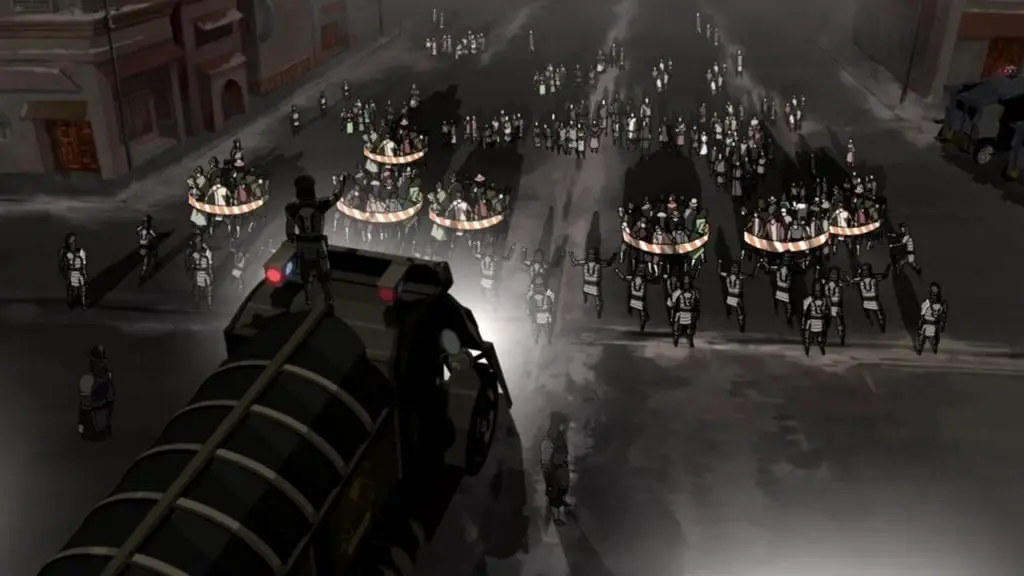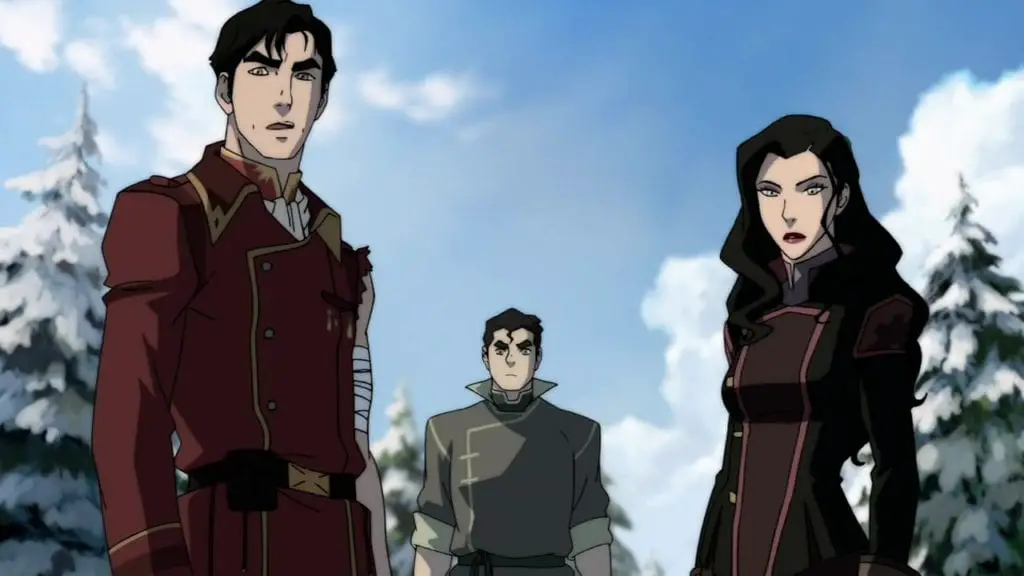A while ago, I wrote an article where I explained how the excellent Marvel Netflix show, Jessica Jones, is quite like a Hunter: the Vigil chronicle. I’m here today to put a different spin on the theme. You see, even though Legend of Korra is a show we go on about a lot around here, it’s not perfect. I, in particular, have issues with its first season. Many of them. And recently, it clicked for me: the first season finale of Korra is very much like an RPG campaign that had to be wrapped up quickly and forgotten about.
Unlike the last time, I will not use any particular system for my example. The way the finale resembles people whose ideas grew out of control is fairly universal, and there’s no single system I would pick for the Avatar universe, either. People have adapted quite a few rule sets to it.
If there’s anyone here who has run a tabletop game, you might be familiar with this sinking feeling as your plot falls apart. As you realize that the story you had in your head just doesn’t come together. That you have grasped more than you can hold. It’s less acute from a player’s point of view, but still there.
I can, therefore, imagine the story of the Equalist revolution as such a story, woven by an ambitious GM who is nonetheless not up to the task. Let’s call this hypothetical GM Clive. He had a good idea for this one. Several good ones, in fact. First, he decided to make the big bad a bloodbender. Then he had another idea: what if the bloodbender could take away bending? Like Aang had, but evil. That would be a real twist. But if he takes away bending, what if he had a whole bunch of followers who thought bending is evil? What if they were non-benders, whom benders bully?

It was too late when Clive realized that those ideas just don’t add up. Why would a bloodbender lead a non-bending revolution? The best explanation our poor GM could come up with was “daddy issues”, a theme he falls back frequently.
Still, before that came to a head, Clive had a whole revolution to plot out. If only he had known how. He didn’t really have a very good idea on how to make it look like a revolution, besides having Amon and some unnamed guy shout bad things from podiums. Eventually, he decided to just run the campaign and figure it out as he went along. He had the beginning in mind, after all.
Unfortunately, the players just weren’t biting the hooks he threw them. Korra’s player (‘et’s call her Juliet) wasn’t terribly interested in a political upheaval. She was playing the Avatar, and she was going to kick some derrière. She also wasn’t really sure why the enemies were all non-benders. Aren’t they, like, super weak? But their boss can take away bending, which is scary. She certainly wasn’t going to let her character be deprived of the thing she spent all her points on. She didn’t even know what a car was at the start!
Mako’s player, Ron, was mostly there for role-playing and personal conflicts. Unfortunately, because he was still a bit new to the whole thing, that meant brooding, love triangles and people who express emotion by either silence of yelling. We all have to start somewhere. At least he didn’t play a short, murderous half-elven wizard in a big hat, like the man writing these words.
Bolin was player by Ron’s sister, Dianne. She was just there to have fun, goof around and tell jokes. Even though her heart and soul was in the game, she likewise didn’t have a lot of patience for a story of a burgeoning revolution.
Asami’s player, Sarah, was really serious about her character. She read the notes. She familiarized herself with the plot and even decided her character would be the daughter or one of the villains. Unfortunately, when the campaign started, a lot of things happened in her life and she just couldn’t really focus on it.
Clive’s job, therefore, wasn’t easy. Try as he might, no one except Sarah treated Amon as a demagogue or revolutionary leader, and she had to skip the first few sessions. He was just this guy in a mask who could take away bending, and his minions were exclusively no-benders. Juliet wanted to beat him up. Everyone else went along with her.
He managed to introduce Amon with a bang, but then he ran into his first problems. Juliet, Ron and Dianne somehow managed to land their characters in a giant pile of Equalists, right under Amon’s nose. Clive hadn’t planned on a direct confrontation just yet. In a rush, he decided that Amon will let them escape, to further some plan of his. He still didn’t know what that plan was, but he was… getting there.
During the very next session, however, Juliet decided that Korra would challenge Amon to a duel, alone. Clive had no idea what to do with that. Should he have Amon ignore it? That would destroy his tenacious image as a legitimate villain. He decided to weasel his way out of it by having Amon appear with a platoon of chi-blockers, monologue at Korra and… well, let her go. Clive realized that if he had Amon take her bending there and then, the entire plot would jump into the endgame a few sessions in. And he still didn’t know what that endgame was. It was mysterious enough that he felt he’d bought himself some time.
After spending a while on interpersonal drama, Clive decided that he needed to crank things up a notch. He felt that his players had no real intention of seeking the Equalists out, but what he failed to notice was that he hadn’t given him much to go on. The Equalists left no clues and everything they did happened off-screen. The players’ lack of interest in the plot was thus partly a result of insufficient engagement. It didn’t help that after Amon’s initial speech, Clive neglected to have any Equalist, or even non-bender, voice their ideology.
In order to amp it up, Clive had the Equalists attack the stadium, as we know. That was a fun session, with plenty of action and Amon making yet another speech. Clive started to believe that everything would work out fine.
The next session let Sarah finally return to the game properly and bring up Asami’s connection to one of the villains. But it brought Clive no closer to properly resolving his plot. As the party cruised Republic City fighting Equalists, he decided to be on the nose and had an NPC yell at Korra: “You’re our Avatar too!”

Unfortunately, all it accomplished was Korra running off to fight Tarrlok alone. Not the result Clive expected. He took the opportunity to have Tarrlok kidnap Korra and deliver his backstory in a vision. Unfortunately, he had forgot to remind Juliet about how she received the first vision of Aang after Amon had knocked her out… So the connection between him and the bloodbenders was still a mystery.
With the plot meandering and no way to advance it, Clive decided to forcefully push it forward. He had the Equalists invade the city. In doing so, he neglected to explain the logistics of it, like how they managed to get all those airships and chi-blockers. He also hadn’t got around to writing the enemy profiles for Equalists using shock-gloves, so he had to use chi-blockers as the rank-and-file enemies.
The party loved it, though. Lots of combat, and the mecha-tanks even provided some challenge. They didn’t even mind having to run away. After they holed up in the sewers, though… Clive realized he’d backed himself into a corner. The Equalists controlled the city. The party had no way to oppose them, other than to just beat them up until they stopped being a problem. Which completely clashed with his initial idea for the campaign.
And that is where everything well and truly breaks down. Clive gives up. He has no way to tie all this together and makes it work. The Equalists are just an army of mooks with a masked leader. The bits of Amon’s backstory he managed to drop, the players missed. And the players seem intent on confronting Amon with his entire army of Equalists.
What does he do, then? He lets Korra and Mako infiltrate the Air Temple Island, where they find… Tarrlok. Who then simply tells them everything they need to know about Amon. Everything Clive had hoped to deliver in a more organic manner. He then has him say he thinks Amon really thinks bending is evil. That was his plan, after all. It just never got to see the light of day.
Juliet and Ron are entirely unsurprised. Of course Amon is a bender. It’d be too easy if he was just a non-bender, right? And no way the campaign’s villain would be one, anyway. Their course of action is obvious: just go and tell everyone that Amon is a bloodbender! Clive just rolls with it at this point.
Meanwhile, Asami and Bolin chase the only other remaining plot hook, which is the Equalists’ airship fleet. Thankfully, no one asks how they got their hands on one. They need to destroy it, but Clive realizes that two people have a poor chance of that. But… he had just introduced an NPC he’s very fond of. General Iroh, the grandson of a character of his from a previous campaign. Why not… just let him destroy the whole fleet? Yes, that’ll work.
In the midst of all this, Sarah manages to roleplay a genuinely poignant scene as Asami confronts her father. It makes Clive wistful for that the campaign could have been.

In the other half of the final session, Korra and Mako storm the Equalist rally with no plan, exit strategy of backup. Clive isn’t really sure what to do here, so he just has Amon chase them by himself as they escape, and use bloodbending on them. Then he realizes just how overpowered he’d made it. In order to prevent him from wiping the floor with Korra and Mako, he has the Lieutenant appear at just the right time for Mako to get a free action.
As Mako and Korra escape, Amon catches up to them again, and Clive declares that Korra can use airbending now, because… she had unlocked her final chakra after seeing Mako about to lose his bending. Yeah, something like that. It doesn’t make a lick of sense to him, but seems to satisfy his players. When Korra blasts Amon with airbending, Clive decides that there’s a window behind him. He falls off and drops into the water. Then he reflexively bloodbends and the water washes off his makeup. He’s a a fraud, and the Equalists give up. Everyone goes home and the revolution is over.
And that, as they say, is that. The campaign had some good combat and action scenes, but everyone agrees the plot unraveled on it. Still, it’s over, and it was fun. Now Sarah can run that sci-fi FATE game she keeps going on about.
Images courtesy of Nickolodeon

